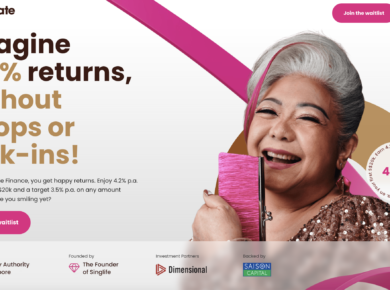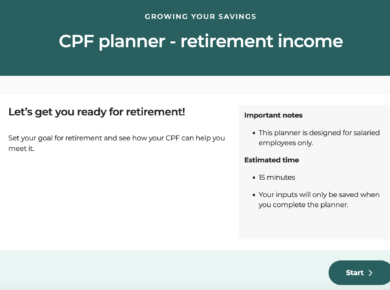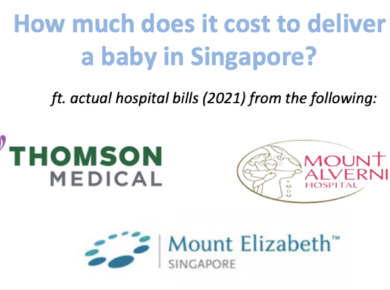1. Live paycheck to paycheck.
A common case for Singaporeans; I know of many folks who barely have any savings because their monthly expenses are almost equivalent to their earnings (or even more, which then leads them to credit card debts).
You know you’re guilty of this when you find that you’re regularly running out of money before your next payday. It gets worse when you have to borrow money from family and friends, take out cash advances or charge to your credit card until you get your next salary cheque.
You may think it is still too early for you to start saving, but many older people often lament that their biggest financial regret was not starting from their very first paycheck.
2. Ignoring the importance of budgeting
No time or energy to budget? It is not as difficult as you think it is. While I don’t operate on a fixed budget for each category, I have an overall budget for my monthly expenses that I try not to exceed. On top of that, I also keep track of my daily spending via a free mobile app (it takes me less than 5 minutes every day).
3. Not checking their bank or credit card statements
There are various reasons to check your statements, or even any bills, for instance. You might realize that you have been unknowingly charged for various items, such as how many shoppers who bought discounted products via coupon-retailer StreetDeals were unaware that they had to pay a $88 monthly fee on top of the coupons.
I made the mistake of not checking my Citibank statements for years, until I realized one day that they had been charging me $10 each month on account fall-below fees. Ridiculous! I don’t even know how much money Citibank made off my ignorance, but it was certainly a lesson to always check my bills at the end of each month.
4. Keeping their money in the same savings account for years.
Financially-savvy folks know how to take advantage of the banks’ attractive savings rates as they fight among each other for a bigger share of the consumer market. The smart ones will not hesitate to move their money around if the higher interest rates make it a good deal.
If you’re still on your POSB account, I hope you’re happy with the low interest rates they give you, while the rest of us are happily basking in our returns from OCBC 360 and UOB One.
5. Paying full price instead of waiting for a good bargain.
I always make it a habit to check various places, including online selling platforms, before I make any purchase. Sometimes, you tend to get rather good bargains if you’re patient enough to wait. For instance, I once got a full bottle of SK-II facial treatment essence for only $50 on Carousell (the trade-off was that I waited 2 months before I came across the deal).
I’ve also been meaning to try Laneige’s latest lip mask after reading about the rave media reviews, but didn’t think it was worth forking out $27.90, especially when I have my own organic lip scrubs from Blended that leave my lips really supple and soft with barely any need for balms. About 3 months after the launch, I came across a deal where it was selling for just $9. Hello Laneige and $16.90 in savings!
Temptation is tough to fight, but you’ll often be handsomely rewarded with a great deal if you’re patient enough.
6. Buying based on price rather than value.
Just because an item is cheap doesn’t mean you should be buying it. For instance, many of my girlfriends buy cheap heels from Bugis Street, but complain endlessly afterwards about the pain.
I have no qualms paying for something if the value justifies (or even exceeds) the price. But of course, it isn’t that easy to convince me that something has value. London Weight Management tried that tactic on me recently and it was futile.
As a value investor, I also try to ensure I don’t buy stocks that are overvalued. Today’s stock market decline is a great time for folks like me to go bargain shopping!
7. Giving into financial peer pressure.
Keeping up with the Joneses can be a painful affair for your wallet. In Singapore, many continue to hanker after the 5 ‘C’s – cash, car, credit card, condominium and country club membership. After my article on saving $20,000 in a year went unexpectedly viral, I had many readers asking me if I had friends, if I even go to cafes, if I ever buy anything for myself…what their questions reflected was a mindset of having to keep up with the latest trends their peers are into, when the key governing principle in my life is instead to just be happy with what I have.
I very much prefer another type of 5 ‘C’s that author Daniel Wong espouses instead:
Compare less.
Cherish what you have.
Choose your attitude.
Complain less.
Change your circumstances and yourself.
8. Not knowing the differences between wants and needs.
A good way to be able to tell the difference is to start making your purchases based on utility cost, rather than price. Utility cost looks at the practical uses you get in return for your money, rather than buying something just because the price seems lower than usual.
Practising self-discipline and not giving into your wants right now will pay off generously in the long run, when your money grows and you’re able to purchase a lot more than you were able in the past.
9. Not having an emergency fund.
A failure to set up an adequate emergency fund can leave you helpless in times of crisis – like when you lose your job, or are suddenly saddled with a major expense for some other reason. Even in times of recession, I’m not too worried about losing my job because I know I have enough to cover me for a few months until I find another job, should the worst happen.
Having an emergency fund also gave me the confidence to quit my first full-time job when I suspected the company was sinking. (Turns out my gut feelings were right – the company closed down earlier this year partly due to their burgeoning debt).
10. Not being adequately covered.
Some people also make the mistake of not ensuring they have sufficient insurance coverage, which can be detrimental if you get hospitalized or lose your job. While I’m skeptical against insurance agents, I fully advocate the notion of having adequate insurance catering to your lifestyle and personal risks. With online portals such as CompareFirst set up by the MAS earlier this year, you can even compare insurance offerings across the various providers, gather the knowledge and come up with a coverage plan for yourself.






11 comments
If i may add one more – having more children than you can afford to.
This comment has been removed by a blog administrator.
Hi SGBB,
No credit card, how to check statement? LOL. Just kidding.
If I am given a chance to add two more points, and it applies to me! I reckon it is the mistake of "absence of philosophical thinking and inner peace in addition to those u correctly mention" These are the intangibles that to me, are so important that propel our financial freedom to the next level. I am still at baby stage of this.
Thanks for the tips
I love your post! Is it alright we can share this on our FB Page?
Sure, go ahead! 🙂
Very true!
You don't own a credit card?!
No problem, glad you like them!
Great post. Btw, I'd love to create an infographic for this post. What do you think?
Augustus @ Bonifacio High Street
Sure Augustus, go ahead! Do let me know when your infographic is done, I would love to republish it and credit back to you 🙂
Comments are closed.